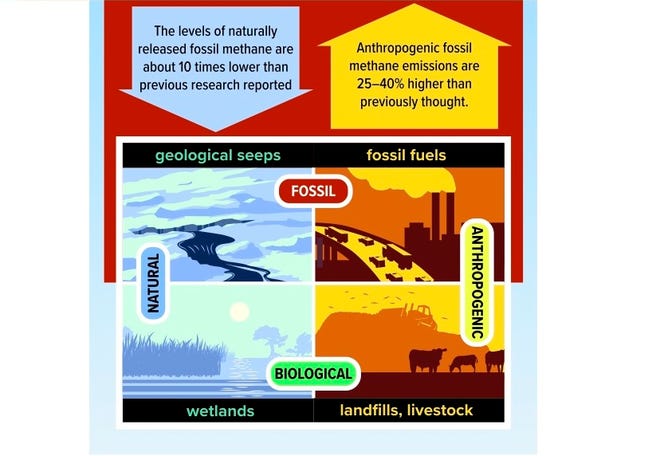By Bernheim
Source: USA Today
Doyle Rice
February 19, 2020
[Editor’s note: articles like these, though not Bernheim specific, are important reminders of why protecting large forest blocks like Bernheim is important. Feel free to share articles like these to LG&E and its parent company, PPL, to demonstrate why saving Bernheim is important to you]
The amount of methane that comes from burning fossil fuels is much higher than previously thought – as much as 40% higher, a new study suggests.
And the amount from natural sources is far lower.
Methane is a potent greenhouse gas, with more than 80 times the climate warming impact of carbon dioxide over a 20-year span. It is also the main ingredient in natural gas and is the second-largest contributor to global warming, after carbon dioxide.
Methane is emitted during the production and transport of coal, natural gas and oil.
Emissions of methane into Earth’s atmosphere have increased by about 150% over the past three centuries, but it has been difficult for researchers to determine exactly where these emissions originate.
10 years to save planet Earth:Here are 6 imaginative climate change solutions
In the study, researchers measured methane levels in ancient air samples from the Greenland ice sheet and found that scientists have been “vastly underestimating” the amount of methane humans are emitting into the atmosphere today via fossil fuels.
There are two types of methane: biological and fossil. Biological methane can be released naturally from sources such as wetlands or human-caused sources such as landfills, rice fields and livestock. Fossil methane, which is the focus of the study, can be emitted through natural geologic seeps or as a result of humans extracting and using fossil fuels.

Reducing fossil fuel use is crucial to reducing climate change, researchers say.
“Placing stricter methane emission regulations on the fossil-fuel industry will have the potential to reduce future global warming to a larger extent than previously thought,” said study lead author Benjamin Hmiel, a researcher at the University of Rochester.
“I don’t want to get too hopeless on this because my data does have a positive implication: Most of the methane emissions are anthropogenic (human-caused), so we have more control,” Hmiel said. “If we can reduce our (methane) emissions, it’s going to have more of an impact.”
That’s in contrast to carbon dioxide, which can persist in Earth’s atmosphere for up to a century: “If we stopped emitting all carbon dioxide today, high carbon dioxide levels in the atmosphere would still persist for a long time,” Hmiel said.
He added, however, that “methane is important to study because if we make changes to our current methane emissions, it’s going to reflect more quickly.”
The study was published Wednesday in the peer-reviewed British journal Nature.


